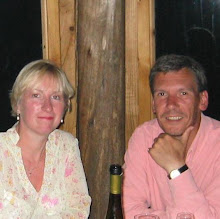This has got to be a first - to have digressed before I've even started to type a post!
I was going to have written something about the World Cup and in particular what seems to me the very low key build up to
Dois Mil e Dez compared with 2006.
Is it just me, but the only sign I've seen anywhere that the WC was even taking place was a very understated ad for a promo being run by Galp (Portuguese petrol company) when I was filling up in Lajes the other day. The chap accepted my 60 Euros for filling the tank but didn't seem to be at all inclined to press a scratch card into my hand with the promise of an all expenses paid trip to South Africa.
Anyway, Day 1 of WC10 was pretty good with plucky little South Africa holding Mexico to a 1-1 draw and even pluckier little Uruguay holding the wretched Frogs to a 0-0 draw.
We don't like France do we? No we don't. I don't know where all this guff about
Entente Cordiale and enmity against Germany comes from. Apart from relatively recent unpleasantnesses in 1914 and 1939, the hereditary enemy has for centuries, of course, been France. Crecy, Agincourt. Camembert. Back in 2003, when Bush and Blair were standing shoulder to shoulder against a country which could deploy weapons of mass destruction in 20 mins and was a threat to international security, it was a total revelation to me they were talking about Iraq when the country they should have been invading was
France. And you simply cannot trust a country whose leader wears ad-height shoes, I'm sorry ...
Anyway, how did I get on to this? Oh yes, the World Cup. And the fact, that, as a total coincidence on day one of WC 2010, I was downloading the Scotsman crossword for Carol on a date in May 2006 when I chanced on something which really got my blood boiling.
Regular readers will be aware that I'm a fan of neither the SNP nor that tawdry rag "the Scotsman". So imagine my blood pressure raising disgust (though I shouldn't have been surprised) to find an article in May 2006 headlined:-
Why Scotland can't Handel (sic) the BBC's new World Cup anthem
If you want a laugh, this is the text of the article [my comments interlined]:
THE BBC was accused [let me guess by whom?] of "insensitivity and tactlessness" last night after choosing to mark the World Cup this summer with a piece of music that celebrates the man responsible for perhaps the most infamous military massacre in Scottish history - the battle of Culloden. [Sure that wasn't the battle of Flodden Field in 1513? Or Bannockburn 1314? Does it depend on the nationality of the people "massacred"?]
See the Conquering Hero Comes, by Handel, will accompany the national broadcaster's coverage of the football tournament from Germany. While the music frequently and innocently accompanied victorious football teams across the UK in the first half of the 20th century, for some Scots [if you're wondering who they are, we get to this below] it has much darker connotations.
Handel composed the score as a tribute to the Duke of Cumberland, more vividly remembered as Butcher Cumberland, who led government forces to victory over the heavily outnumbered Jacobites at Culloden.
Last night, politicians [guess who!] and historians criticised the choice of a song which celebrated the massacre. Rob Gibson, the SNP's Highland and Islands MSP [why does that not surprise me! the gesture politics maestro!], said: "How can they possibly encourage people to support the England team when we are exposed to symbols of oppression like this?
"As far as I'm concerned the BBC often causes offence with its insensitivity to Scottish history At a time when multiculturalism is being celebrated, I can't understand how they can be so insensitive. It's an anglocentric view they have of the world and of music." [Thanks for standing up for me, Rob. I don't know what I'd do without the likes of you to protect me from the BBC].
The MSP, who has written a number of books on Scottish history [not very good ones, obviously], including a recent one on the clearances, said the BBC should be making more programmes on history and how these events shaped the world.
Ted Cowan, Professor of Scottish history at Glasgow University, described the choice of song as tactless, but said it was typical of the outdated sentiments that often surface in football. "I think it's pretty tactless to revive something like that," he said.
Prof Cowan said Culloden had been misrepresented in history as a battle of nations. He added: "Culloden was not actually a battle between Scotland and England, there were Scots and English on both sides. [This is the important point the SNP chooses to overlook.] But the authorities in London hijacked the victory and portrayed it as beating the rebellious Scots."
About 1,000 of the 5,000 troops loyal to Charles Edward Stuart, Bonnie Prince Charlie, were slaughtered by the 9,000-strong troops of William Augustus, the Duke of Cumberland at Culloden, in just 40 minutes, on 16 April, 1746. The battle, which took place on moorland near Inverness, forever shattered the Jacobite dream of installing a Stuart on the British throne. A further 1,000 Highlanders who fled the battlefield died in the subsequent weeks. [What's wrong with that? They were in armed rebellion against the Crown.]
Angus MacNeil, the SNP's culture spokesman at Westminster and Western Isles MP, said he regretted the fact that the BBC's move could give "posthumous publicity" to Cumberland, "a man who should be forgotten in a way Bonnie Prince Charlie will never be". [So the SNP supports foreign (French!) inspired attempts to invade this country and overthrow its government, does it?]
While Culloden is still regarded as an infamous event by many in Scotland, it was celebrated extensively at the time, by both the English and some lowland, Protestant Scots happy at the defeat of the Jacobites, who were mainly Catholics and Episcopalians.
The London government encouraged those celebrations, and Handel, a German who lived most of his life in England, composed See the Conquering Hero Comes as his contribution. His classical anthem has now been adapted by Andrew Davis, and the modern rendition, performed by the BBC Concert Orchestra and BBC Singers, has been entitled Sports Prepare"
And this is me - the serious point here is that this is the level of political debate the SNP and the Scotsman operates on. Frightening. Not funny.










